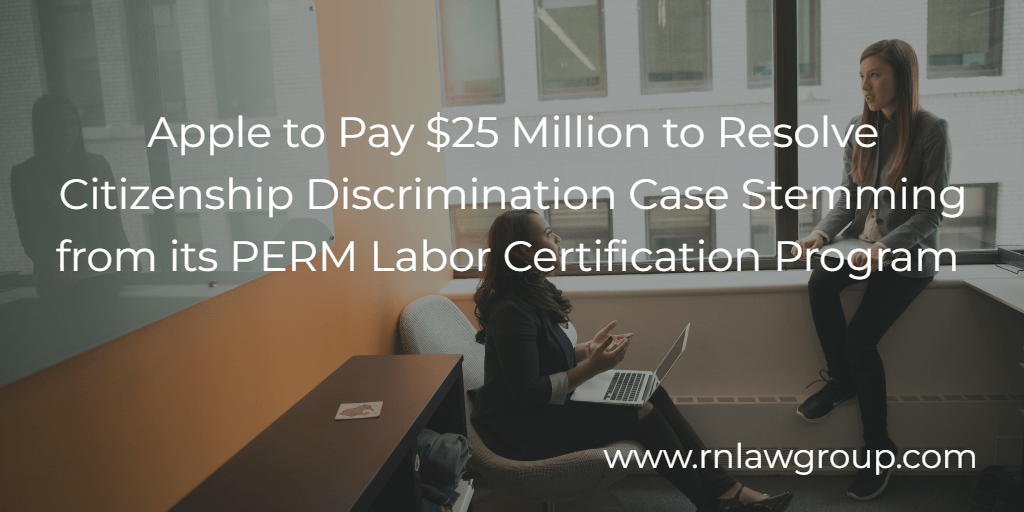
Apple to Pay $25 Million to Resolve Citizenship Discrimination Case Stemming from its PERM Labor Certification Program
In a significant development, the Department of Justice (DOJ) finalized a landmark agreement with Apple to resolve claims of discriminatory practices in its hiring and recruitment processes against U.S citizens and certain non-U.S. citizens. Under this agreement, Apple is required to pay up to $25 million in back pay and civil penalties, making this the largest award recuperated by the DOJ under the anti-discrimination provision of the Immigration and Nationality Act (INA).
The root of the settlement revolves around the DOJ’s determination that Apple violated the anti-discrimination requirements outlined in the INA during its recruitment for positions falling under the permanent labor certification program (PERM). PERM is often the first step in the employment based green card process. In order to sponsor an employee for lawful permanent resident status in the U.S., an employer must first comply with specified recruitment and program prerequisites. Specifically, employers must post an advertisement of the PERM position in multiple mandated mediums in order to test the U.S. labor market for able, willing, qualified and available U.S. workers. If during this recruitment process no such U.S. workers are found for the sponsored position, a PERM labor certification application can be filed with the DOL. The PERM program is overseen by the U.S. Department of Labor (DOL) and the U.S. Department of Homeland Security (DHS).
As a result of its extensive investigation that began in 2019, the DOJ found that Apple engaged in a pattern or practice of citizenship status discrimination during its PERM-related recruitment. This practice, the DOJ said, unlawfully discriminated against U.S. citizens, U.S. nationals, lawful permanent residents and individuals granted asylum or refugee status, ultimately deterring them from applying for positions that Apple sought to fill by PERM beneficiaries.
Specifically, the investigation revealed that Apple failed to advertise PERM positions on its external job website (employer website) even though Apple normally posted positions there. Further, Apple instructed applicants to apply by mailing paper applications to the company instead of allowing applicants to submit electronic applications as it did for non-PERM positions. Even more, the DOJ found that in some cases, Apple did not consider certain applications for PERM positions from its own employees if those applications were submitted electronically, as opposed to paper applications submitted through the mail. Taken together, these recruitment efforts resulted in few to no applications received for PERM positions.
Based on the settlement agreement, Apple is required to do the following:
- Pay $6.75 million in civil penalties and establish an $18.25 million back pay fund for eligible discrimination victims.
- Ensure that its recruitment for PERM positions more closely matches its standard recruitment practices.
- Conduct more expansive recruitment for all PERM positions, including posting PERM positions on its external job website, accepting electronic applications, and enabling applicants to PERM positions to be searchable in its applicant tracking system.
- Train its employees on the INA’s anti-discrimination requirements and be subject to departmental monitoring for the 3 year period of the agreement.
Key Takeaway for Employers
Employers sponsoring foreign workers through the PERM based green card process must ensure full compliance with both PERM regulations and anti-discrimination laws in order to avoid potential legal repercussions. Although Apple technically followed PERM regulations by posting the requisite advertisements for the specified period of time mandated by the DOL, the Department of Justice took it a step further, essentially implying that Apple may have followed PERM regulations, but the elected method of recruitment led to discriminatory practices by the company.
For example, the DOL regulations do not specifically address how employers must instruct applicants to apply for the PERM position, only that employers must “direct applicants to report or send resumes, as appropriate for the occupation, to the employer.” Further, for example, under PERM regulations for professional positions, employers are required to post three additional recruitment steps. The DOL provides employers with a list of ten methods to choose from. The regulations do not state which three the employer must choose, only that “the employer must select three additional recruitment steps from the alternatives.” From this perspective Apple complied with all PERM regulatory requirements. Still, the DOJ seems to indicate that the company overlooked the spirit of the regulations, or what is referred to as “good faith recruitment.” This implication puts PERM employers in a tough situation moving forward.
Considering the recent case involving Apple, employers should ensure that their recruitment efforts for PERM positions align as closely as possible with their standard recruitment procedures in order to avoid claims of discriminatory practices. To do so, employers should review their PERM recruitment procedures to decide if the best methods are selected within the limitations of the PERM regulations. Further, employers should strongly consider employee training on PERM regulations and anti-discrimination laws. In doing so, employers should work with a qualified immigration attorney to help navigate this complicated process.
At Reddy Neumann Brown PC our team is dedicated to helping our clients navigate the complex PERM labor certification process and the challenges employers may face. As an immigration law firm that has been serving our clients for over 25 years, our team is here to offer prompt, practical, and professional advice, whether you’re a company seeking to hire top talent to grow your business or a foreign worker wanting to develop a career in the United States.
If you have any questions, please schedule a consultation with one of our attorneys at https://appointments.rnlawgroup.com/.
Krystal Alanis is a Partner at Reddy Neumann Brown PC with over 10 years of experience practicing U.S. business immigration law. Krystal manages the firm’s PERM Labor Certification Department, where she oversees all EB-2 and EB-3 employment-based green card matters. Krystal guides clients from a variety of industries through the maze of the PERM Labor certification process and has handled thousands of PERM applications throughout her career. Krystal guides employers through the I-140 and Adjustment of Status process, and assists clients with temporary work visas. Further, she oversees the firm’s I-9 compliance team where she advises employers regarding Form I-9 Employment Eligibility Verification requirements and conducts internal audits of a company’s I-9 records, processes, and procedures. Additionally, Krystal represents clients in Form I-9 U.S. Immigration and Customs Enforcement (ICE) inspections (Notice of Inspection). Krystal successfully settled a claim with ICE over Form I-9 substantive paperwork violations that led to an 88% reduction in civil fines for her client.

